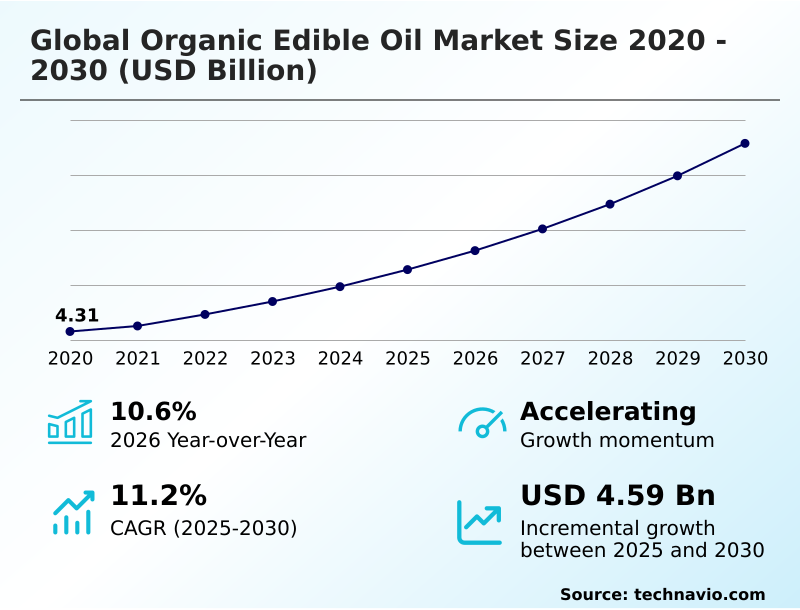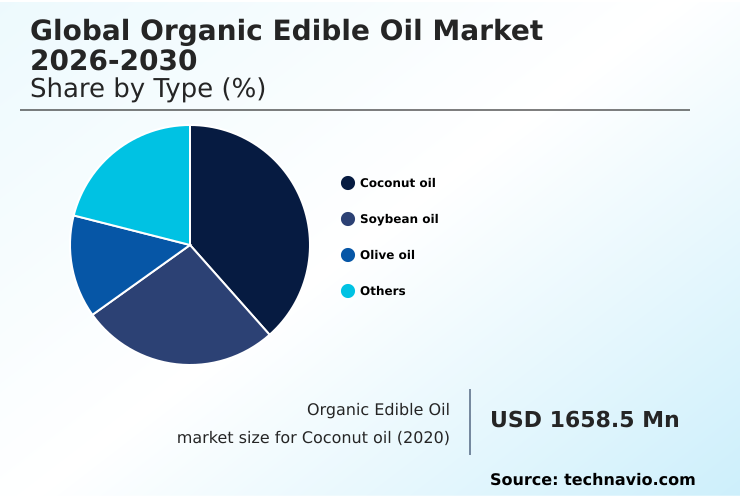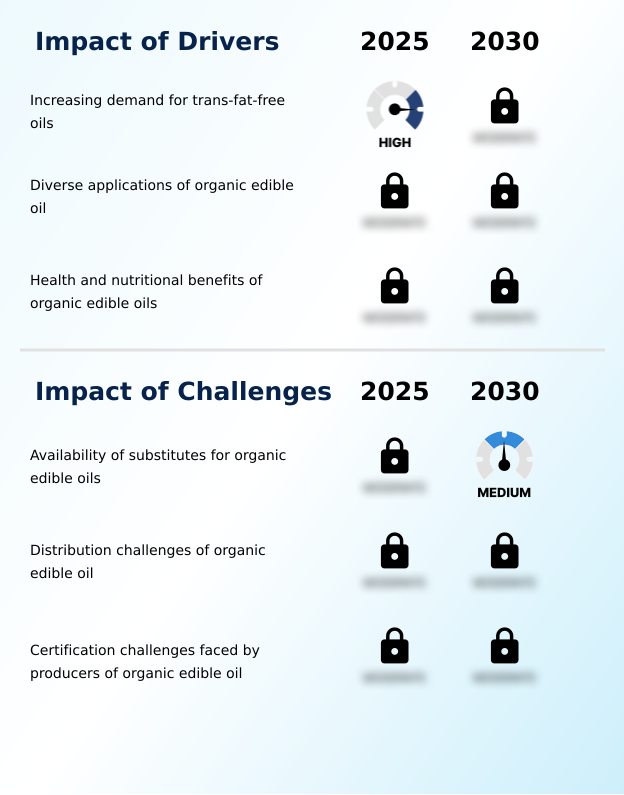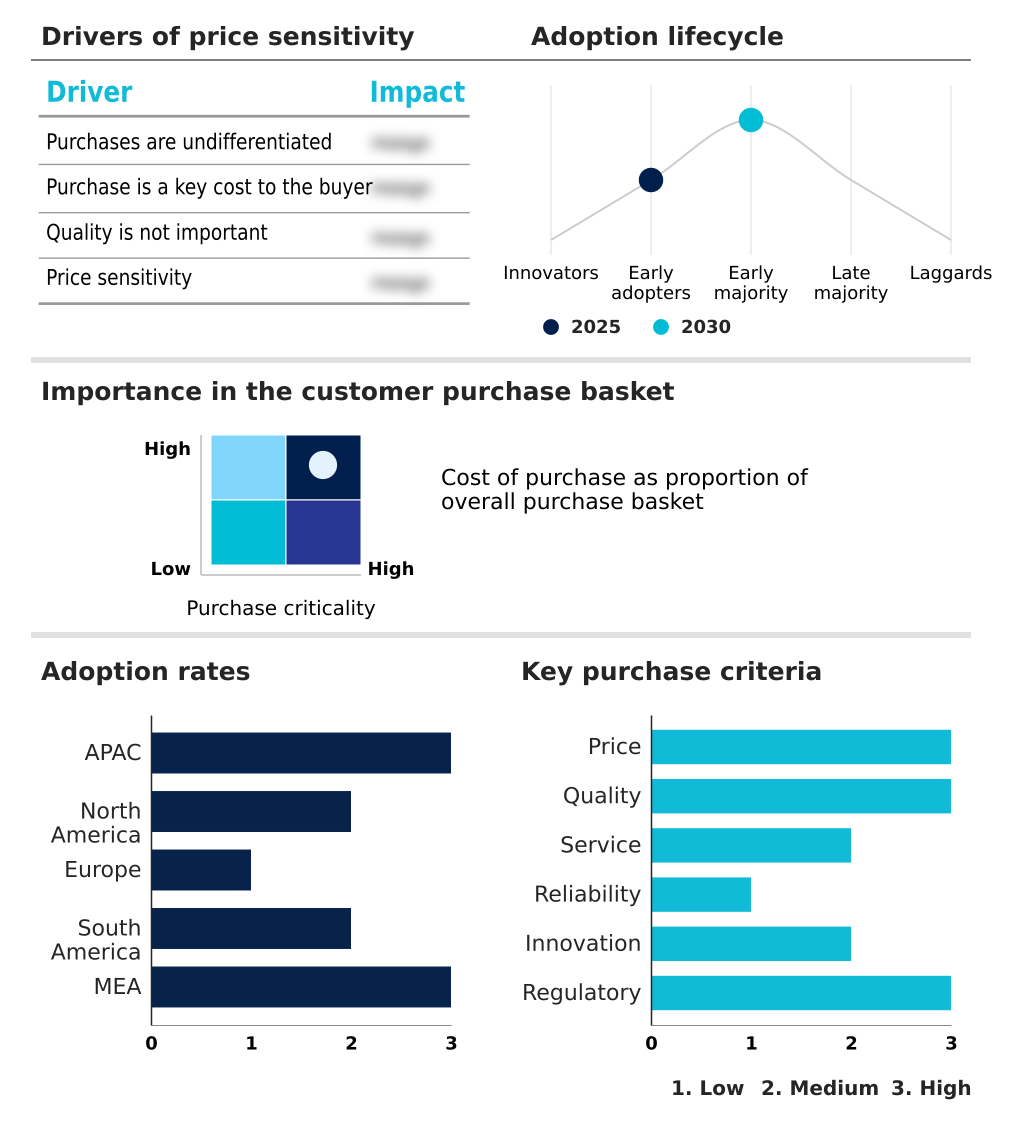Organic Edible Oil Market Size 2026-2030
The organic edible oil market size is valued to increase by USD 4.59 billion, at a CAGR of 11.2% from 2025 to 2030. Increasing demand for trans-fat-free oils will drive the organic edible oil market.
Major Market Trends & Insights
- APAC dominated the market and accounted for a 36.2% growth during the forecast period.
- By Type - Coconut oil segment was valued at USD 2.30 billion in 2024
- By Distribution Channel - Offline segment accounted for the largest market revenue share in 2024
Market Size & Forecast
- Market Opportunities: USD 6.83 billion
- Market Future Opportunities: USD 4.59 billion
- CAGR from 2025 to 2030 : 11.2%
Market Summary
- The organic edible oil market is defined by a pronounced consumer shift toward health, wellness, and transparency. This movement is driven by a demand for clean-label ingredients, trans-fat-free oils, and products with clear functional health benefits that support preventive healthcare.
- The market's trajectory is also shaped by the diverse culinary applications of oils with specific properties, such as high smoke points for high-heat cooking. In a typical business scenario, a food processor aims to launch a new line of organic salad dressings.
- To meet consumer expectations and regulatory requirements, the company implements traceability technologies to ensure complete supply chain transparency from farm to shelf. This validates claims of non-gmo project verified sourcing and adherence to usda organic certification standards, building consumer trust and securing premium retail placement. However, the industry navigates challenges including price-sensitive consumer behavior and complex international certification standards.
- The rise of direct-to-consumer e-commerce and subscription-based models offers new pathways to market, bypassing some traditional distribution hurdles and fostering brand loyalty.
What will be the Size of the Organic Edible Oil Market during the forecast period?
Get Key Insights on Market Forecast (PDF) Request Free Sample
How is the Organic Edible Oil Market Segmented?
The organic edible oil industry research report provides comprehensive data (region-wise segment analysis), with forecasts and estimates in "USD million" for the period 2026-2030, as well as historical data from 2020-2024 for the following segments.
- Type
- Coconut oil
- Soybean oil
- Olive oil
- Others
- Distribution channel
- Offline
- Online
- Type of packaging
- Bottles
- Jars
- Cans
- Others
- Geography
- APAC
- China
- Japan
- India
- North America
- US
- Canada
- Mexico
- Europe
- Germany
- UK
- France
- South America
- Brazil
- Argentina
- Colombia
- Middle East and Africa
- Saudi Arabia
- UAE
- South Africa
- Rest of World (ROW)
- APAC
By Type Insights
The coconut oil segment is estimated to witness significant growth during the forecast period.
The coconut oil segment holds a significant position, driven by consumer perception of its functional health benefits and versatility.
High concentrations of medium-chain triglycerides and medium-chain fatty acids distinguish it as a preferred source for health-focused diets focused on preventive healthcare and cholesterol management. Beyond culinary applications, the sector benefits from its use in plant-based formulations.
This dual utility sustains demand, contributing to over 30% of non-culinary applications in the specialty oils category. Supply chains rely on fair trade supply initiatives, with organic certification agencies ensuring quality.
To justify a premium, manufacturers are innovating with cold-pressed extraction and virgin variants that preserve flavor, offering a high smoke point suitable for various trans-fat-free oils for cooking.
The Coconut oil segment was valued at USD 2.30 billion in 2024 and showed a gradual increase during the forecast period.
Regional Analysis
APAC is estimated to contribute 36.2% to the growth of the global market during the forecast period.Technavio’s analysts have elaborately explained the regional trends and drivers that shape the market during the forecast period.
See How Organic Edible Oil Market Demand is Rising in APAC Request Free Sample
The global market exhibits distinct regional dynamics, with APAC emerging as the primary growth engine, projected to contribute over 36% of the market's incremental growth.
In mature markets like Europe, demand is sophisticated, with a focus on single-origin products and items with protected designation of origin. These regions face high retail shelf space competition and distribution channel complexity, necessitating robust logistics networks.
The clean beauty movement has also become a significant factor, with consumers seeking oils with third-party certifications. To foster brand loyalty programs, companies are using packaging with advanced photo-oxidation protection and flexible packaging formats.
Success hinges on building consumer trust, as evidenced by a 20% increase in sales for brands that provide clear traceability.
Market Dynamics
Our researchers analyzed the data with 2025 as the base year, along with the key drivers, trends, and challenges. A holistic analysis of drivers will help companies refine their marketing strategies to gain a competitive advantage.
- The global organic edible oil market 2026-2030 is experiencing a significant transformation, driven largely by consumer preference for clean-label edible oils and a deeper understanding of their nutritional value. Shoppers are actively comparing organic vs inorganic edible oils, seeking out trans-fat-free cooking oil alternatives for daily use.
- This trend highlights the growing interest in the health benefits of organic coconut oil and the use of organic olive oil for skin hydration. Consequently, demand for the best organic oil for high-heat cooking has surged.
- On the supply side, producers are responding by focusing on sustainable palm oil production methods and adopting regenerative agriculture for oilseed crops to ensure long-term viability. However, the industry grapples with the challenges in organic oil certification process, as meeting usda organic certification requirements for oils is both costly and complex.
- Distribution challenges for organic food producers further complicate market access. The impact of online retail on edible oil sales has been profound, with e-commerce strategies for organic brands becoming critical for growth. Firms leveraging online channels report customer acquisition costs up to 20% lower than those using traditional retail.
- The role of packaging in organic oil preservation is also paramount, leading to innovations like bpa-free packaging for edible oils.
- This focus on supply chain transparency in the food industry, from sourcing organic soybean oil in processed foods to detailing the diverse applications of organic flaxseed oil, is key to building consumer trust and navigating the expanding private-label organic oil market growth.
What are the key market drivers leading to the rise in the adoption of Organic Edible Oil Industry?
- The escalating demand for trans-fat-free oils, driven by heightened health awareness among consumers, serves as a primary driver for market expansion.
- Heightened health consciousness is a primary market driver, with consumers actively seeking products rich in monounsaturated fatty acids and polyunsaturated fats.
- The demand for clean-label ingredients has spurred a 25% increase in searches for oils containing beneficial compounds like alpha-linolenic acid. This shift is compelling manufacturers to adopt regenerative agriculture practices and ensure supply chain transparency.
- Retailers are adapting with enhanced merchandising solutions and category management strategies that highlight these attributes, leading to a 15% better sales performance for transparently-labeled products.
- The growth of direct-to-consumer e-commerce allows brands to communicate these benefits directly, leveraging differentiated packaging with light protection packaging and moisture barrier packaging to preserve quality and build consumer confidence in the omnichannel shopping experience.
What are the market trends shaping the Organic Edible Oil Industry?
- The increasing influence of online retailing channels is reshaping the market's distribution landscape, creating new opportunities for consumer outreach and profitability.
- Key trends are reshaping market dynamics, driven by the convergence of e-commerce and wellness. The rise of private-label organic brands in major retail channels is making eco-friendly products more accessible, with some chains reporting a 20% increase in this category's sales.
- Simultaneously, the clean beauty movement is fueling demand for natural cosmetic ingredients, where the skincare benefits of oils are a primary selling point. This has led to a 15% rise in the use of certain organic oils in plant-based formulations for cosmetics.
- Sustainable farming and ethical sourcing are now baseline expectations, validated by non-gmo project verified and usda organic certification labels. Food traceability has become a crucial tool, with brands using it to prove their commitment to non-hydrogenated fats and sustainable packaging, enhancing consumer trust.
What challenges does the Organic Edible Oil Industry face during its growth?
- The widespread availability and lower price point of conventional edible oil substitutes present a significant challenge to the market growth of organic alternatives.
- The market faces persistent challenges from price-sensitive consumer behavior, with lower-cost inorganic oil substitutes capturing nearly 60% of total volume sales. This is compounded by complex food safety regulations and international certification standards that increase operational costs. For instance, achieving compliance can add an estimated 10-15% to production expenses, a significant barrier for smaller producers.
- The industry is responding with innovations in sustainable packaging solutions, including biodegradable materials and flexible packaging formats that offer portion control packaging to appeal to budget-conscious consumers.
- Leading companies are adopting advanced traceability technologies and circular economy principles to streamline compliance and justify premium pricing, while digital marketing campaigns for subscription-based models aim to build loyalty and mitigate the impact of price sensitivity.
Exclusive Technavio Analysis on Customer Landscape
The organic edible oil market forecasting report includes the adoption lifecycle of the market, covering from the innovator’s stage to the laggard’s stage. It focuses on adoption rates in different regions based on penetration. Furthermore, the organic edible oil market report also includes key purchase criteria and drivers of price sensitivity to help companies evaluate and develop their market growth analysis strategies.
Customer Landscape of Organic Edible Oil Industry
Competitive Landscape
Companies are implementing various strategies, such as strategic alliances, organic edible oil market forecast, partnerships, mergers and acquisitions, geographical expansion, and product/service launches, to enhance their presence in the industry.
Adams Group - The company offers organic edible oil products, including coconut oil, soybean oil, and palm oil, tailored for diverse market needs.
The industry research and growth report includes detailed analyses of the competitive landscape of the market and information about key companies, including:
- Adams Group
- Agronic Food Pvt. Ltd.
- Aryan International
- Black and Green
- Bunge Global SA
- Cargill Inc.
- Catania Spagna
- Clearspring Ltd.
- Eden Foods Inc.
- EFKO
- ENZO Olive Oil
- Nimbark Organic
- NOW Health Group Inc.
- Nutiva Inc.
- The Grupo Daabon
- The Hain Celestial Group
- Viva Naturals Inc.
Qualitative and quantitative analysis of companies has been conducted to help clients understand the wider business environment as well as the strengths and weaknesses of key industry players. Data is qualitatively analyzed to categorize companies as pure play, category-focused, industry-focused, and diversified; it is quantitatively analyzed to categorize companies as dominant, leading, strong, tentative, and weak.
Recent Development and News in Organic edible oil market
- In August 2025, Amazon expanded its same-day delivery services for groceries, including a wide variety of organic edible oils, to over 2,300 cities across the United States, enhancing the online retail channel's competitiveness.
- In September 2025, Cargill introduced a new line of recyclable packaging for its edible oils, reflecting an industry-wide move toward sustainability and circular economy principles in packaging.
- In July 2025, Bunge Global finalized its merger with Viterra, creating a powerhouse in global agribusiness with enhanced logistical and processing capabilities expected to streamline organic oil supply chains.
- In March 2025, Whole Foods Market expanded its international footprint by opening a new 21,800-square-foot store in London, featuring an expanded section for organic pantry staples to meet growing European demand.
Dive into Technavio’s robust research methodology, blending expert interviews, extensive data synthesis, and validated models for unparalleled Organic Edible Oil Market insights. See full methodology.
| Market Scope | |
|---|---|
| Page number | 294 |
| Base year | 2025 |
| Historic period | 2020-2024 |
| Forecast period | 2026-2030 |
| Growth momentum & CAGR | Accelerate at a CAGR of 11.2% |
| Market growth 2026-2030 | USD 4591.6 million |
| Market structure | Fragmented |
| YoY growth 2025-2026(%) | 10.6% |
| Key countries | China, Japan, India, South Korea, Australia, Indonesia, US, Canada, Mexico, Germany, UK, France, Italy, Spain, The Netherlands, Brazil, Argentina, Colombia, Saudi Arabia, UAE, South Africa, Turkey and Israel |
| Competitive landscape | Leading Companies, Market Positioning of Companies, Competitive Strategies, and Industry Risks |
Research Analyst Overview
- The organic edible oil market is advancing beyond simple organic claims to a more sophisticated value proposition centered on specific technical attributes and verifiable sourcing. Consumer demand is increasingly focused on oils with beneficial nutritional profiles, such as those rich in monounsaturated fatty acids, medium-chain triglycerides, and alpha-linolenic acid, often derived through cold-pressed extraction.
- This requires stringent adherence to standards like usda organic certification and non-gmo project verified labels, compelling companies to invest in traceability technologies for enhanced supply chain transparency. A key boardroom-level decision now involves committing to sustainable packaging solutions, aligning with circular economy principles through the use of biodegradable materials and mono-materials for recycling to reduce environmental impact.
- Firms that successfully integrate these technologies and practices report significant operational gains; for instance, leveraging advanced traceability systems has been shown to reduce compliance reporting errors by over 40%.
- The market is also seeing a push toward clean-label ingredients and innovative plant-based formulations, supported by fair trade supply initiatives and regenerative agriculture practices that ensure the long-term health of the ecosystem.
What are the Key Data Covered in this Organic Edible Oil Market Research and Growth Report?
-
What is the expected growth of the Organic Edible Oil Market between 2026 and 2030?
-
USD 4.59 billion, at a CAGR of 11.2%
-
-
What segmentation does the market report cover?
-
The report is segmented by Type (Coconut oil, Soybean oil, Olive oil, and Others), Distribution Channel (Offline, and Online), Type of Packaging (Bottles, Jars, Cans, and Others) and Geography (APAC, North America, Europe, South America, Middle East and Africa)
-
-
Which regions are analyzed in the report?
-
APAC, North America, Europe, South America and Middle East and Africa
-
-
What are the key growth drivers and market challenges?
-
Increasing demand for trans-fat-free oils, Availability of substitutes for organic edible oils
-
-
Who are the major players in the Organic Edible Oil Market?
-
Adams Group, Agronic Food Pvt. Ltd., Aryan International, Black and Green, Bunge Global SA, Cargill Inc., Catania Spagna, Clearspring Ltd., Eden Foods Inc., EFKO, ENZO Olive Oil, Nimbark Organic, NOW Health Group Inc., Nutiva Inc., The Grupo Daabon, The Hain Celestial Group and Viva Naturals Inc.
-
Market Research Insights
- The market is shaped by dynamic consumer behaviors and evolving retail strategies. Brands that have successfully implemented subscription-based models are reporting customer retention rates up to 25% higher than those relying on single purchases. In physical retail, effective category management strategies have boosted sales velocity for premium oils by 15% by creating a clear distinction from inorganic oil substitutes.
- This omnichannel shopping experience, integrating both digital marketing campaigns and in-store merchandising solutions, is critical. The complexity of inventory management systems remains a hurdle, but the shift toward differentiated packaging and direct-to-consumer e-commerce is creating new efficiencies and avenues for growth.
We can help! Our analysts can customize this organic edible oil market research report to meet your requirements.






